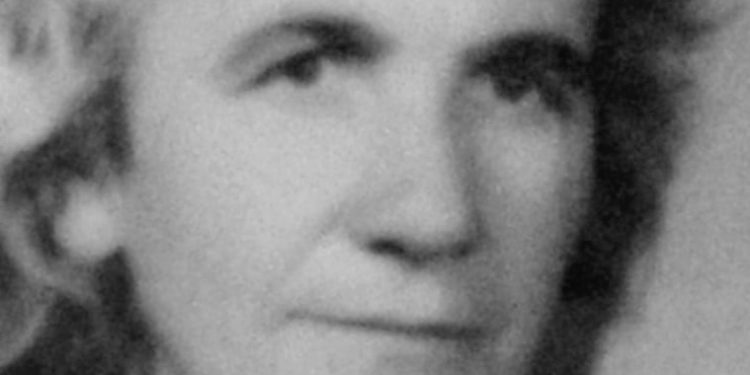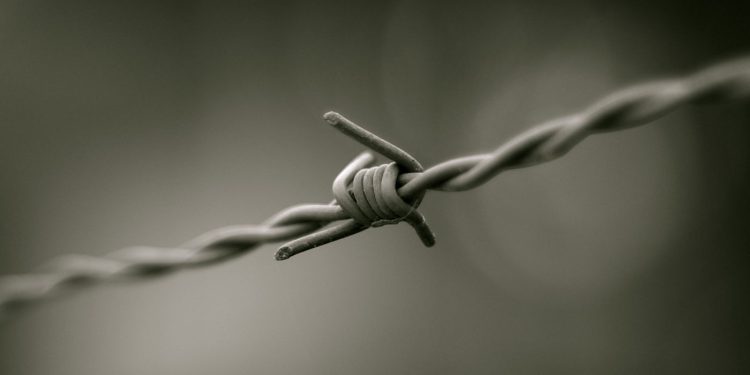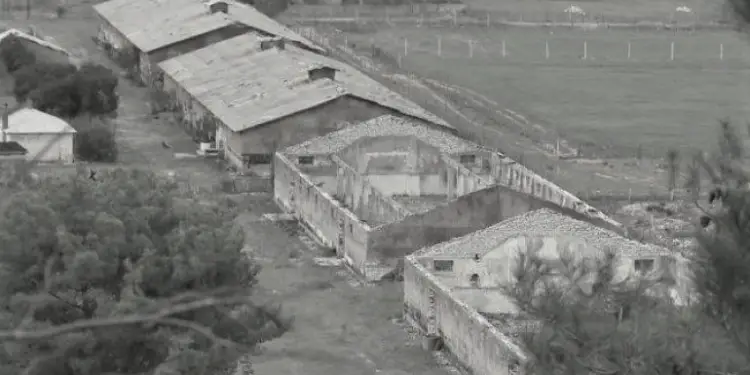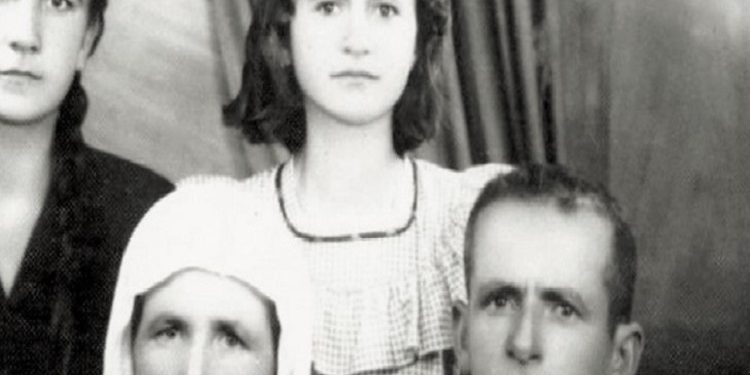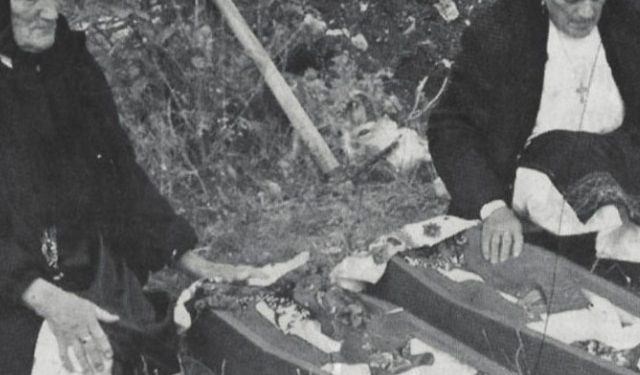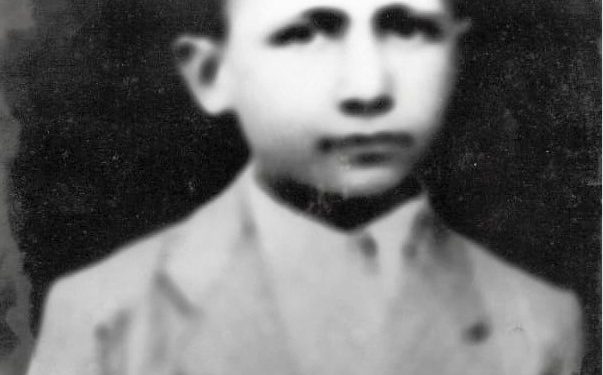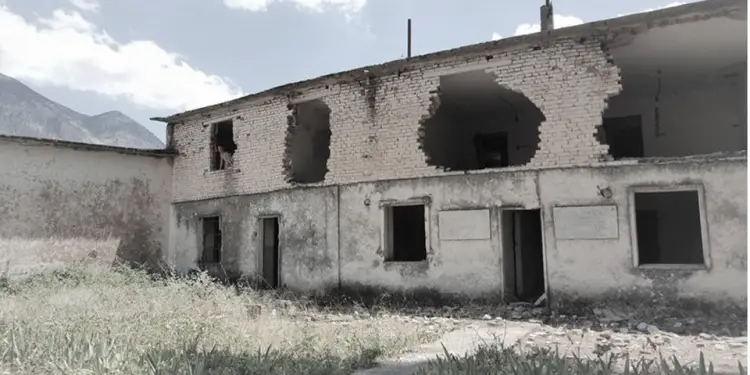By Neritan Kolgjini
– The story of the surviving daughter Asije Elezi Habil, how the 5 children of Ramazan Habil’s family from Kavaja died in 1945-
Memorie.al / When I heard the following story for the first time, it seemed so scary to tell, or to mention, that I couldn’t memorize it, much less write it down. But over time, with the expansion of knowledge and readings of this nature, I increased the desire to know more deeply, more deeply and more fully this whole series of episodes, which tells how a family was martyred and almost disappeared the entire Albanian population in the extermination camps in Berat and Tepelena.
It was the year 1945 and the family of Ramazan Habil from Gjinaj (Habilaj) of Kavaja, all exiled to Berat, without any legal basis, without committing any crime, without breaking any law, without any human reason, but they were the family members of a the political opponent, Rama, nothing else! The list of interned included his wife and young children, all 18 years old and under; Rama’s sister, Laje Gjoci (Habili) with her son; Rama’s stepmother, Pashja; Rama’s bride Nafija and his brother, Dalipi.
Of these people, only the biggest and physically strongest manage to escape, do you think we were dealing with a biological selection process or a racial experiment where only the most resistant manages to make it to the end of this inhuman ordeal? Called internment in the camps of communism.
From this family, 5 children died and Rama’s stepmother, an old woman known as Tushe’s Nana. The brother, Dalipi, loses his mental faculties for a while, from the tortures of the executioners who had just taken power.
In order to provide details about this family and national tragedy, we talked to one of the survivors of this horrific event, Asije Elezin (Habil), who today, having crossed the 80s, can hardly resist telling what she saw suffered personally in those hellish years in the Berat and Tepelen internment camps.
Ms. Asije, who was interned among you, and at what time?
We were interned when the communists took power, it must have been the beginning of 1945. We were: Nan Vathja (Rama’s wife), me, Xhevati, Qefserja, Mukadesi and Nexhmija (Rama’s close family .our); then there were Pashja or Nana e Tushes, (Rama’s stepmother); Aunt Laja (Rama’s sister, widow, married to Beqir Gjocin, our saint) together with her son Osman; we also had Nafije (Rama’s bride, Hamid’s son’s daughter-in-law), pregnant, as well as uncle Dalipi (Rama’s brother).
Together as a group, we also had a woman with two daughters from Luzi i Kavajë, Dije Hoxha, who was interned because their son Mal Hoxha was on the run with Baba Rama.
What about Ragip, Rama’s second son, where was he?
Ragip was not with us, because the day they came to the tower (in Habilaj, our name) to take us and put us in Kavaja prison, he was out of the house. While he was coming back from school, we noticed that we were surrounded and Nafija came out the window and told him: “leave, because we are surrounded!” He leaves the village and we know that Baba Rama has left the bequest to a family in Romanat of Durrës.
He stayed there for over 6 months and then came to Ballhutje, to the family of Rap Tog (Sadiu), who was a nephew of ours. There they discover him and arrest him. They torture him and the owner of the house in an inhuman way, because they had met Rama and had to tell him where he was. After keeping him in the dungeon for some time, they also bring Ragip to Berat.
Where did you live and why did you live in the Berat camp?
We stayed in Berat for about 4 years. At first they put us in the “Pasha’s House” in the Mangalem neighborhood, then later in Berat Castle. In the summer, they took us to Kuçovo, to work in agriculture or different jobs that were assigned to us, without any payment, i.e. forced labor, while in the winter they locked us in the Castle.
Two of our children died here. When we were in Mangalem, Nejhmija, the three-year-old younger sister, and Fatmira, the daughter of my brother Hamid and Nafija, died. We said in despair, but also from the naivety of age, what is this name Fatmira, when it had such a black fate! But she died quickly, not even 6 months old, because of the lack of food, milk, and the primitive conditions where we lived.
Nexhi, I remember he died vomiting blood from his mouth for a long time. I can’t say what kind of illness it was, I have no idea. Here, Mukadesi, who we called Desi for short, also fell ill. She required medical treatment and hospital and good living conditions, which we, who were in the grip of existence, could not even imagine. Desi, thursday all over body, as far as I remember it was a kidney problem.
In the meantime, we are informed that we will be transferred to Tepelena. We had heard that it was a bad and difficult road, therefore Nan Vathja begged the doctor who was treating her, to keep her and put Desi in the hospital, crying about her plight as a mother and confessing the death of her other children. He answers that: “We cannot know the life of this one. Take it with you”!
We know it was brave to do something like that, as the Home Branch Section wouldn’t allow it when it came to the family of an internee. After two weeks, in Tepelena, Desi died in an indescribable state. The doctor had ordered us not to feed him with pickles, salts, chilies, etc., but our food was only with these, that is, bread with salt, brine, or bread with leeks.
I remember that one day, I found Desi behind the door picking up and swallowing the scraps of the “meal”, which were a few bread crumbs and yellowed leeks, which we had swept up and prepared to throw in the trash. I rebuke him rather harshly, even reminding him of the doctor’s order! But ah, how could I understand, as a teenager at that time, that she was so hungry that she even collected the bread crumbs and inedible leek tails that we had thrown away!
I remember that when we were in Berat, she went every day to Magia, the lady of the house, who had a small flock of sheep. We spoke harshly to him, asking him to account: why?! She answered us, – “Give me a spoonful of milk”! Desi would help him take the sheep out and put them back in the shed, and Magia would reward him with a spoonful of milk.
Osmani, aunt Laje’s son, also falls ill here, who is also sick all over his body. He was the same age as my brother Ragip. Aunt prays to release him, which luckily was granted. Osmani dies after a while at home. Her other son, Sula, had also died, so she was left alone with her daughter, File. But we would meet Aunt Laje in Tepelena sometime later, when she was deported for the second time, together with uncle Dalipi, because of the meetings they had with Baba Rama.
And in Tepelena, how did they take you?
We were loaded into a truck, accompanied by 3 policemen each, and we were 2 or 3 families in a car, in the upper body, discovered. It was summer at least. We traveled for a long time and once we arrived exhausted in Turan of Tepelena, at the barracks of the Italian army.
During the trip there was an accident, a car overturned near Roskovec, if I remember, and the two parents died, but the 4 children were saved, who “flew” through the thorns. I remember their father who was stuck in the body of one of the sides of the car, as if they had crucified him! It was terrifying to see that scene with your eyes…!
In Tepelena, we didn’t know what was waiting for us, and we couldn’t even imagine it anyway. But what we suffered and lost was beyond imagination. They left us eight days in a row without bread and no opportunity to feed. People began to starve. Meanwhile, the trees of the bush around the camp were “cleaned” of leaves, which we began to collect and boil in the form of cabbage, with a handful of rice, enough to quench the hunger. Mass dysentery began and the border between man and beast was very close. People went crazy talking to themselves.
Tell us a little about Desi, how did you deal with this situation?
Under these conditions, we also had to think about the illness of little Desi, 8 years old. She was hungry and we had nothing to give her. I remember what he said to Nana Dija (Dije Hoxha, from Luzi i Madh, exiled with her two daughters, Bakusha and Drita, our note), – “Why, Nana Dija, these laknas of yours boil faster”…?!
“Like that!? Come on, Desi, because I’ll give you nana lakna, now, right away”! He gave some of his daughters’ share to the sick Desi. We were six children, the “cabbage”, a mixture of wild grape leaves, thorns and herbs, we used in larger quantities, which required more time to boil, but Desi could not wait.
After eight days of extreme hunger, they started bringing us corn bread from Berat. Bread had its name because it was actually something like dough, moldy, almost green, and not baked at all and in very small quantities for people’s needs. We started to ration it and share it. It was, without exaggeration, a piece equal to a matchbox today that holds 50 threads.
Could a person live with this amount of food…?! But the many deaths, in fact, somehow alleviated this hunger. More than 8 or 10 people died a day. When 3 or 4 died, it was called a day with few dead. There were 8 barracks and in 2 months they died, who remembers how many people, maybe half.
Once I see Desi who ate an excessive ration and as a bigger one, I say to him: – why did you eat my ration as well? She sees me scared and as if surprised, while Nana Vathja intervenes and says: – it’s okay, I don’t want to, let Desi eat my piece!
Until I die, I will never forget those scenes when we had no way to feed or treat our little sister, who died more from hunger than from illness.
The hygienic conditions were terrible. They gave us the opportunity only once a week to wash our clothes in the stream, just with mountain water, without soap, detergents, etc…! We were accompanied and guarded by policemen, who were former partisans, who had nothing in common with humans.
They divided the internees into two groups, those able to work and those unable, due to age, etc. Those of us who were called young people, me and Ragipi, were sent to Memaliaj, where we worked with a pickaxe for the opening of the highway. We lived in army tents.
One morning a guard comes and informs me that my brother was looking for me.
I go out to the fence and meet my brother, Ragip, who tells me to get ready and go to the camp, because Uncle Hekri (Hekuran Saraçi, uncle, our name) had come, who had orders from Bab Rama not to return without I saw all the children. I oppose him and say: “And you, why don’t you come”?! He explains to me that they didn’t let him run away from work.
I left for the barracks together with an old man who brought us food on horseback, who was from the Shkodra Highlands. On the way, he asked me how many sisters or brothers I had, how old they were, etc., etc. I was not paying attention to his words; however I told him that we are 3 sisters and 3 brothers! He asked me about my name and age and almost annoyed me with those questions that I called trashy!
When I get close to the camp in Turan, I hear women’s voices whispering: “This guy’s sister has died”! I did not understand and it seemed unbelievable that those words were for me! When I arrive at barracks no. 2 where my family was, I find out that Desi was buried! I start to scream and to this day I can’t get over the sadness of losing my sister. I wanted to go see him one more time and insisted on opening the grave, just to kiss him one last time.
They explained to me that they had put it directly in the ground, without a coffin, or “shulse”, or grave boards, so that they could protect the corpse. They made it clear to me that all those stones and dirt had already ruined her tender face! I cried there until no more tears came out and I returned with a shattered soul to the barracks, where the life of exile continued! Even today, my mind tells me, I know the place where he is buried, on that hillside in Turan…!
Mother Vathja had asked to bring her son, Ragip, to bury her sister, but they did not give her permission. Desi was buried by some elders who were still alive. Desi’s death at the age of 8 weighed on our spirits and I remember that I spent most of my time in tears.
You also had a brother who died in Tepelena…
– Yes, Xevatin…! I swear to you that the last moments of his life are unbelievable, if you haven’t seen them with your own eyes. I shot unfortunately that I have seen them and I am confessing to you. It was August, a year after Desi’s death. Xhevat got dysentery, but he didn’t tell us. For 2 days in a row, he went back and forth to the bathrooms, which were 40 m. away from the barracks where we were staying.
Then he surrendered and said to Nana Vathe: “I’m sick, my stomach hurts, I’m sick”! She visited the doctor, actually a camp nurse. She finds out that he had dysentery and says that she will give him injections. The cure begins, every day from a needle, but no effect. The situation worsens. Only 5 days he could go to the bathroom.
Then he couldn’t get out of bed. He began to vomit only blood from his bowels, because he was not eating anything. We didn’t tell the man, because we were afraid of being kicked out of the camp, since dysentery is contagious. For the last two or three days, the bleeding did not stop. Nana used to wash the rags that we put under the mattress in the tap and she told us that they oozed a lot of blood, as if it was a slaughtered animal, so much blood was flowing.
On the last day, when he is dying, the nurse comes to perform the ritual. Xhevati says to him: – “It’s useless; I don’t care about your needles! Don’t come tomorrow! Shortly after the nurse leaves, he asks for a glass of water. Nana calls me and says: – get into the bed, pick him up, sit up, so that he can drink water more easily. I sit on the bed, place her between my legs and wrap my arms around her body to hold her upright, resting her head on my chest.
Nana approaches and hands him a cup of water. He passes the first sip, while he can’t pass the second, spilling it to the side of his lips. At this moment, Nana clearly sees what happened, but she says to me more easily:
-“Hold well, because he is falling asleep! Lay carefully in bed”! I obey him and turn to look him in the face. It seemed to me that he was slightly changed and as if a special shadow had fallen on him. At that moment, I see Nana closing her eyes and saying:
-“Bad nonna, quickly leave me! You and I had so much togetherness (our common life together)”…!? At that moment I realized that my brother had given up and I gave him to the horse, as I believe they felt me in all the barracks. Xhevati got sick on Friday and died on Saturday after eight days! He was only 13 years old.
Nana ties the floor to her waist and leaves for the Camp Directorate. He meets the Deputy Director, who I remember was called the Eye. He informs him that his son has died and asks him to tell a policeman to go to Tepelena to buy a few meters of cambric for the shroud. The internees were not allowed to go outside the camp. Addressed with the words:
– “Lord, my son is dead”!
Well done! – He answers.
“Okay, you say, but I have trouble burying him, and I don’t have the shroud”! – says the desolate nana!
“There is as much fern, stone and earth as you want”! – returns the official named Syrja.
Nana returns to the barracks, tears some clothes and makes a shroud with them. In the meantime, we had notified a Hoxha, interned of course, who performs the funeral rituals, according to the Muslim rules, by washing and purifying him. While another old man helps us fix a coffin, which was made from a wooden crate we had with us.
We had the intention to take Xhevati’s remains from there and bury him in Kavaja. A group of elders, just like in the case of Desi’s death, picked up and took the little brother to the cemetery at the foot of the Tepelena bridge, about 400 meters from the camp. The graves were ready; there was no need to open them.
Even this funeral is put into the ground irregularly, without putting gravestones or boards, while the box that played the role of the coffin, was broken by the falling of the first stones, squeezing the body and the broken bones. As Muslims, we believe that the body must be preserved, since only at the end of 40 days, it begins to break down and decompose. Nana orders us again:
-“Let’s go have dinner! I came to you now that Xhevati is gone! He has gone to his place! It’s not good not to eat tonight, because it makes him feel bad”!
He had buried 4 of his own children and was afraid that the two sisters we had left would also die! Tushe’s Nana, Bab Rama’s stepmother, could not move from her bed. He cursed himself for living and seeing the death of children. After 6 months, she also died and we buried her at the internees’ cemetery. Memorie.al




